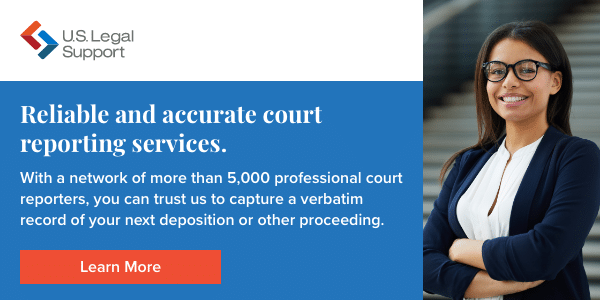What Is a Virtual Deposition Notice?

Virtual depositions and other legal proceedings are part of the post-pandemic new normal for the United States legal landscape. Instead of arriving at the office in your shined shoes early enough to locate the restroom, grab a beverage, and settle around a conference table, virtual deposition protocol requires you to log into the designated virtual meeting platform with a working webcam and microphone.
A virtual deposition notice is your invitation to that meeting platform. They’re vital to attend the deposition and must be handled with as much care as a traditional, in-person deposition notice.
What Is a Virtual Deposition?
Video depositions are scheduled by either side of a legal case during the discovery phase. They are crucial to researching and gathering data to help build or defend against a suit or criminal accusation.
If you can’t physically shake hands with everyone at a meeting, your deposition can be virtual. This can be either:
- A fully virtual deposition where all parties log in from their own location, or
- A hybrid event where one or more parties join virtually with one or more groups gathered together in person
Remote attendees will connect through a video platform that allows both audio and visual connection to other parties. The virtual aspect of the deposition does not alter the event’s import, legality, or elements. It will still incorporate:
- A court reporter to administer the oath and capture spoken words verbatim
- A deponent who is required to attend or appropriately respond to the notice
The result of the deposition is an official, sworn, out-of-court statement from the deposed witness that may be used at trial as direct evidence or to impeach contradictory remote witness testimony. (1)
What Does a Notice of Deposition Include?
A remote deposition notice will include the “5 W’s” of the event: who, what, when, where, and why. These include: (2)
- The deponent’s name, address, and other contact details
- A signature and contact information for the deposing attorney
- The case caption, file number, jurisdiction, and plaintiff and defendant details
- The deposition date and time
- The location, either physical or details for the virtual “where”
A notice may also show: (2)
- Discussion topics if an organization deponent needs to appoint a representative
- Records, documents, or physical evidence the deponent should bring
- Involved attorney names, contact information, and who they each represent
- Whether the deposing attorney reserves the right to present the record at trial
- Whether the court reporter will provide realtime deposition reporting
Note that virtual deposition notices will vary by state. Individual state laws provide additional guidelines related to the deposition process, such as a minimum amount of notice before the date of a scheduled deposition, method of notification, or other important information.
Why Are Virtual Deposition Notices Needed?
Virtual deposition notices carry the same legal weight as a conventional deposition notice, summoning the invited witnesses and other parties to appear at a given time and (virtual) location. They are often provided electronically via email rather than by mail, courier, or fax.
In addition to standard required elements for a deposition notice, summons, or subpoena, a virtual deposition notice may include:
- Specifics on the meeting platform that will be used
- A hyperlink or instructions about logging in
- A meeting password to access the deposition
- Options for separate audio connection if available
- Options for international connectivity if participants are international
- Links or information related to system setup and support
What to Do When You Receive a Virtual Deposition Notice
It may seem cut and dried, but following a quick cheat sheet in response to a virtual deposition notice will ensure your witnesses start on the right foot. In addition to standard prep, you’ll want to check these boxes.
Check Your Connection
Before the deposition date, make sure you’re ready to use the meeting platform. This includes:
- Downloading or updating any meeting software or app
- Testing your hardware and connectivity
- Setting up in a professional location with adequate lighting
- Using a headset microphone for better audio
Prep Your Witness to Attend Virtually
Ensure your client goes through the same steps above, and remind them to speak clearly into the camera and show up in professional attire even though the deposition is virtual.
Don’t wait until the last minute for this step. Troubleshooting connectivity or hardware issues doesn’t just cause delay for the other parties; it can fluster and frustrate an attendee—which is not the mental state you want your witness to be in while kicking off their sworn remote testimony.
Get More Virtual Deposition Help from U.S. Legal Support
U.S. Legal Support has delivered robust legal support services to attorneys of all practice sizes and types since 1996.
We provide court reporters of all methodologies for on-site and virtual events, top-notch technical support during your court proceedings, records retrieval and analysis, and litigation consulting. Our secure file storage and exchange comply with SOC 2 Type 2 and HIPAA regulations.
Learn more today about how we can help with your needs.
Sources:
- Cornell Law School. Rule 30. Depositions by Oral Examination. https://www.law.cornell.edu/rules/frcp/rule_30
- Sacramento County Public Law Library. Discovery Depositions. https://saclaw.org/wp-content/uploads/sbs-discovery-depositions.pdf

Editoral Policy
Content published on the U.S. Legal Support blog is reviewed by professionals in the legal and litigation support services field to help ensure accurate information. The information provided in this blog is for informational purposes only and should not be construed as legal advice for attorneys or clients.


